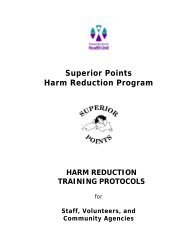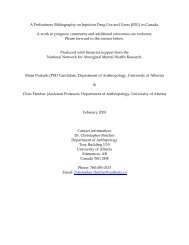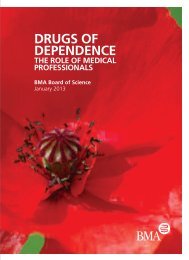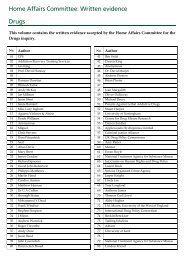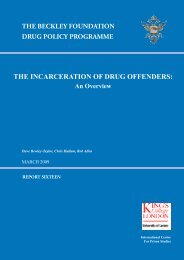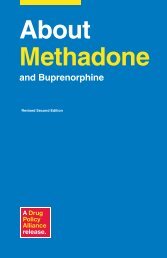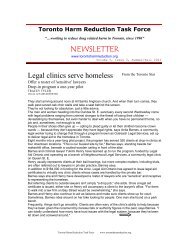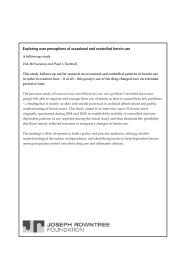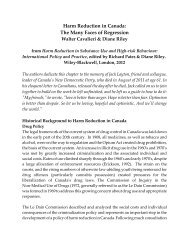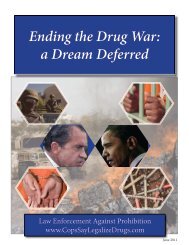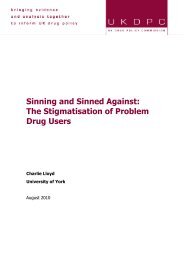Canadian Journal Addiction Medicine - Canadian Harm Reduction ...
Canadian Journal Addiction Medicine - Canadian Harm Reduction ...
Canadian Journal Addiction Medicine - Canadian Harm Reduction ...
Create successful ePaper yourself
Turn your PDF publications into a flip-book with our unique Google optimized e-Paper software.
CSAM 2012 Conference Abstracts<br />
Smoking Cessation: A<br />
Contemporary Approach<br />
Andrew Pipe, CM, MD<br />
University of Ottawa Heart Institute<br />
Smoking cessation is the most powerful, effective and efficient<br />
of all preventive interventions. The importance of smoking<br />
cessation is more often expressed in rhetoric rather than<br />
in the delivery of effective, evidence-based, contemporary<br />
programmes of cessation. Systematic approaches to the<br />
identification and treatment of smokers in all settings<br />
should be seen as a standard of care in the 21 st century.<br />
Unambiguous, non-judgmental, personally relevant advice<br />
regarding the importance of cessation allied with bestpractice<br />
use of cessation pharmacotherapy can substantially<br />
increase cessation rates. Current practices and controversies<br />
will be addressed in this presentation which will also address<br />
the needs of those with other co-morbidities.<br />
use and alcohol use combined. Although it is often the<br />
first addiction to start and the last one to be treated, most<br />
addicts do not describe it as their drug of choice. Moreover,<br />
addiction treatment providers often fail to address this<br />
addiction because of belief and lack of understanding<br />
of how to address this addiction concurrently with other<br />
addictions. Recent advances in the neurobiology of addictive<br />
disorders ( specifically tobacco addiction) and smoke free<br />
bylaws have increased options to address this addiction. This<br />
talk will describe the neurobiological basis of this particular<br />
addiction, review the evidence for intervention and describe<br />
effective behavioural and pharmacological strategies in<br />
various concurrent addictive disorders.<br />
Motivational Interviewing For<br />
Smoking Cessation<br />
Alexandra Andric & Dr. Peter Selby<br />
Centre for <strong>Addiction</strong> and Mental Health<br />
November 2012<br />
Catalyst Program<br />
Carolyn Whiskin<br />
A comprehensive, interactive, guidelines-centric, flexible,<br />
modular, tool-based continuing health education (CHE)<br />
program tailored to augment the knowledge and skills<br />
of <strong>Canadian</strong> pharmacists on how to manage tobacco<br />
dependence using a standard approach and practical tools<br />
in their everyday practice. The program is designed to<br />
encourage knowledge translation and clinical application<br />
of the United States Public Health Service clinical practice<br />
guidelines on Treating Tobacco Use and Dependence: 2008<br />
Update* through discussion of realistic cases and practicebased<br />
tools that can be adapted to reflect different pharmacy<br />
practice and provincial realities. There are five modules that<br />
comprise the CATALYST program. Modules 1, 2 and 5 are<br />
delivered in novel, interactive, audio-based CD-ROM format<br />
that lends itself to flexible self-learning. Modules 3 and 4<br />
are designed as interactive, live workshop programs led by a<br />
trained facilitator.<br />
Neurobiology Of Smoking<br />
Cessation<br />
Dr. Peter Selby<br />
Centre for <strong>Addiction</strong> & Mental Health<br />
Tobacco <strong>Addiction</strong> kills more people than other substance<br />
Tobacco use exacts a major toll on the lives of <strong>Canadian</strong>s,<br />
resulting in 37,000 deaths per year. Health care practitioners<br />
can play an important role in motivating behavior change with<br />
regards to tobacco dependent individuals. Through the use<br />
of a case study, this session will focus on the basic principles<br />
of motivational interviewing and how to incorporate the<br />
essential skills needed in order to motivate ambivalent patients<br />
towards behavior change.<br />
POINTS OF PROCESS:<br />
Reflection on Behavioural<br />
<strong>Addiction</strong>s<br />
Bruce Ballon Bsc MD ESP(C) FRCPC<br />
Director of Education for SIM-one (Simulation Ontario<br />
Network of Excellence<br />
This presentation will provide a brief overview of medical<br />
issues some in the field term “process addictions”, such as<br />
sex, shopping, videogaming, gambling i.e. maladaptive<br />
behavioural patterns that result in dysfunction for the<br />
individual. The concepts will be looked at from multiple<br />
aspects of determinants of health to help demonstrate<br />
many of the similarities and some of the nuances of these<br />
conditions. Drawing on literature and the work being done at<br />
a small clinical initiative at CAMH devoted to tackling these<br />
issues, approaches for engagement, assessment and treatment<br />
will be discussed.<br />
14




